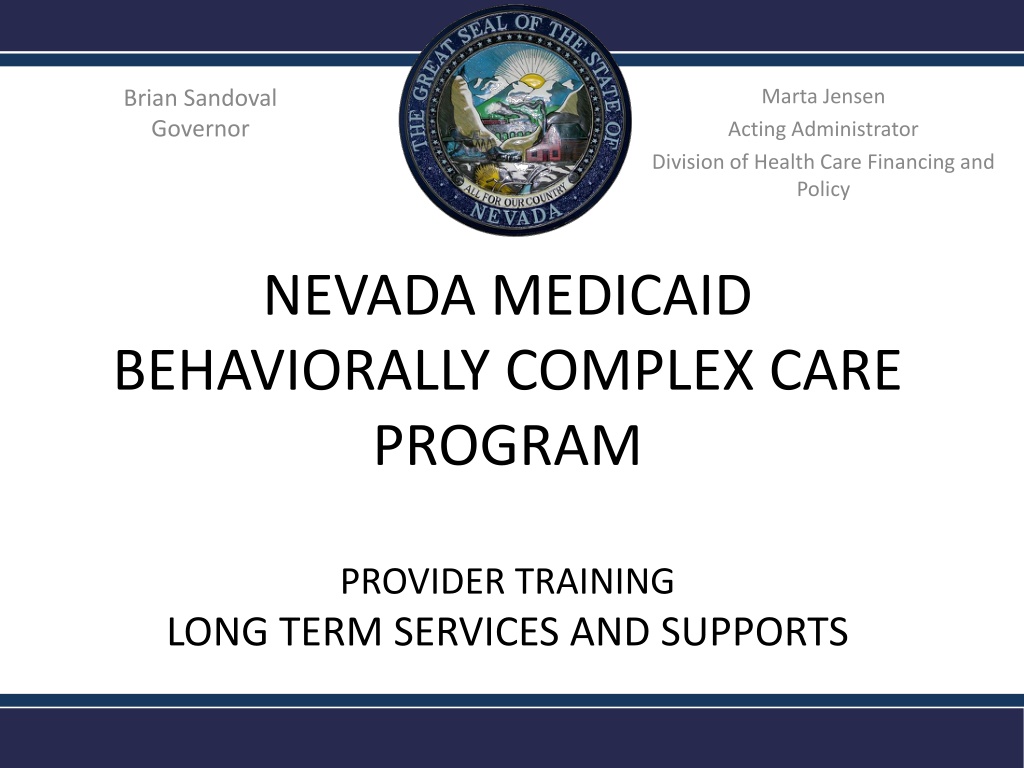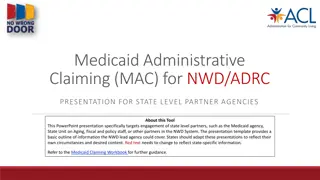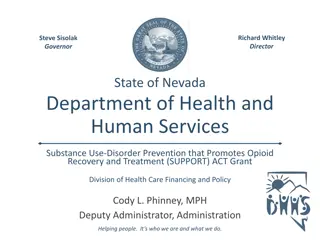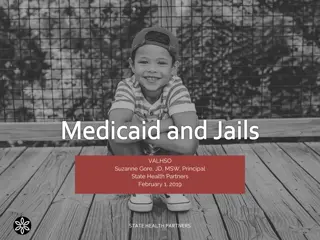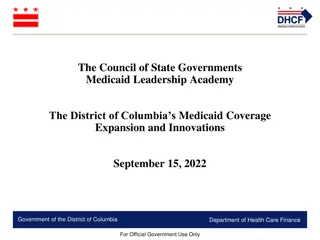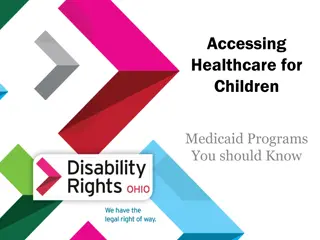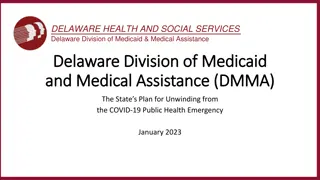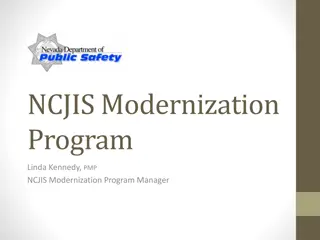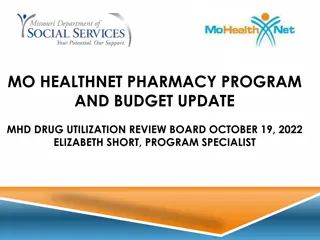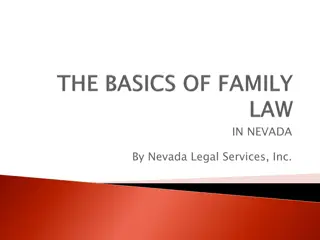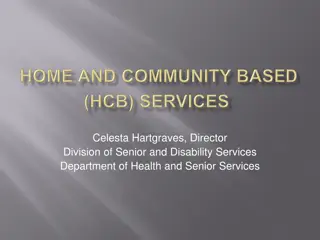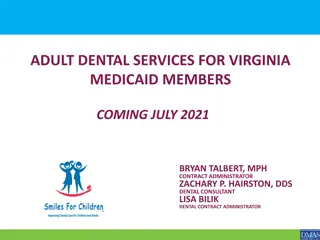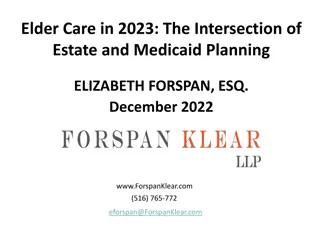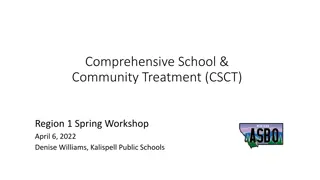Nevada Medicaid Behaviorally Complex Care Program Overview
The Behaviorally Complex Care Program (BCCP) in Nevada provides specialized care for Medicaid recipients with medically-based behavior disorders. Established in 2014, the program offers tiered rate services for individuals posing a danger to themselves or others. Eligible recipients must be over 18 and reside in a certified nursing facility. The program addresses aggressive behaviors supported by severe mental health or medically-based diagnoses. Provider responsibilities include managing disruptive behaviors that require additional resources. Medicaid Fee-For-Service recipients benefit from necessary behavioral health services to enhance their overall wellbeing.
Download Presentation

Please find below an Image/Link to download the presentation.
The content on the website is provided AS IS for your information and personal use only. It may not be sold, licensed, or shared on other websites without obtaining consent from the author. Download presentation by click this link. If you encounter any issues during the download, it is possible that the publisher has removed the file from their server.
E N D
Presentation Transcript
Marta Jensen Acting Administrator Division of Health Care Financing and Policy Brian Sandoval Governor NEVADA MEDICAID BEHAVIORALLY COMPLEX CARE PROGRAM PROVIDER TRAINING LONG TERM SERVICES AND SUPPORTS
HISTORY OF THE BCCP The Behaviorally Complex Care Program (BCCP) was established with the intention of providing care in Nevada for individuals with medically-based behavior disorders resulting in the Medicaid recipient posing a danger to self and/or others. A core group was established in 2014 to clarify the process and to create a care program supported by a tiered rate for behaviorally complex individuals . 2 Division of Health Care Financing and Policy
Behavioral Health Services 42 C.F.R. 483.40. : Each resident must receive, and the facility must provide the necessary behavioral health care and services to attain or maintain the highest practicable physical, mental, and psychosocial wellbeing, in accordance with the comprehensive assessment and plan of care. 3 Division of Health Care Financing and Policy
BCCP The BCCP is available for any Nevada Medicaid Fee-For- Service (FFS) recipient over the age of 18, residing in a free-standing Medicaid Certified Nursing Facility (NF). The BCCP is a tiered payment reimbursement benefit for recipients who demonstrate consistent aggressive behaviors ranging from self-injury/self-harm, to refusing medications/ADL s. These behaviors are supported by a severe mental health diagnosis alone, or a medically-based diagnosis which supports the aggressive behavior(s). 4 Division of Health Care Financing and Policy
Medically-based Disorders Medically-based disorders may include (not all inclusive) : Traumatic/Acquired brain injury Dementia Alzheimer s Huntington s Chorea Parkinson s Depression Psychosis Alcohol/Drug related Dementia 5 Division of Health Care Financing and Policy
PROVIDER RESPONSIBILITIES NF s must demonstrate that the resident has a history of persistent disruptive behavior that is not easily altered and requires an increase in resources from NF staff. 6 Division of Health Care Financing and Policy
AGGRESSIVE BEHAVIORS Aggressive behaviors come in many forms. Keep in mind that pacing, wandering, hallucinations and sad face are not acceptable aggressive behaviors unless they are pre-cursors to immediate aggressive behaviors. Recipients on hospice and those with suicidal or homicidal ideations cannot apply for the program. Recipients in MCO s are not eligible for the BCCP. 7 Division of Health Care Financing and Policy
AGGRESSIVE BEHAVIORS Injures self/Self- Harm AEB actual self-injury to skin/body. Getting up unassisted or disconnecting trach do not qualify per the medical definition of self-injury/Harm. Physical Aggression AEB assaults on residents, staff and property AEB throwing things, hitting, kicking, spitting, holding up a fist. Verbal Aggression AEB extreme disruptive sounds, noises, screaming, and use of offensive language. 8 Division of Health Care Financing and Policy
AGGRESSIVE BEHAVIORS Regressive Behaviors AEB sexual, disrobing, smearing/throwing of food/feces, stealing, hoarding, going through other resident/staff belongings. Behaviors that Resist Care AEB resident refusal/resistance of personal care activities, eating, or medications. 9 Division of Health Care Financing and Policy
BCCP TIERS Tier I- behaviors requiring a minimal amount of intervention or assistance. Reimbursement is $111.23 per day. Tier II- serious behaviors requiring moderate intervention. Reimbursement is $222.45 per day. Tier III- Extreme behaviors exhibiting danger to themselves or others requiring frequent intervention. Reimbursement is $326.26 per day. 10 Division of Health Care Financing and Policy
BCCP TIERS The requested tier will be evaluated based on the frequency and degree of the behaviors exhibited utilizing the BCCP evaluation tool. The behaviors must be categorized as follows: Always- the recipient requires daily intervention for behaviors Usually- the recipient requires interventions four or more days per week Usually Not- the recipient requires interventions less than four days a week Never- the recipient does not have behaviors that require interventions 11 Division of Health Care Financing and Policy
TIER RENEWALS Supportive documentation for the next Tier period must be submitted for review with each tier renewal period as follows: Tier I: Renew annually. Tier II: Renew every 180 days. Tier III: Renew every 90 days. Should the BCCP not be approved, the NF will receive the base rate for the applicable quarter. The BCCP tier level is determined independently of any NF Level of Care (LOC). 12 Division of Health Care Financing and Policy
REVIEW PROCESS After the review, the facility will receive a Notice of Decision (NOD). The results of the NOD will be one of the following: 1. The request is approved at the tier requested. 2. The request is approved for a higher tier than requested. 3. The request is approved for a lower tier than requested. 4. The request is denied. 13 Division of Health Care Financing and Policy
Pre-admission Approval for the BCCP 14 Division of Health Care Financing and Policy
PRE-ADMISSION APPROVAL LTSS has reached out to the acute care community of discharge planners, case managers and social workers to assist with the placement of recipients with aggressive behaviors. The acute care staff notifies LTSS of a potential candidate for the BCCP submitting everything they have to support the program. This process is slightly abbreviated for the acute care milieu in order to expedite discharge to a Long Term Care Facility. 15 Division of Health Care Financing and Policy
BCCP CONTACTS Rosanne Hoff HCC III RN Nursing Facilities Unit Supervisor: rhoff@dhcfp.nv.gov 775-684-3757 Jaime Hutchison AA III: jaime.hutchison@dhcfp.nv.gov 775-684-3619 Mary Field HCC II RN, BSN: mfield@dhcfp.nv.gov 775-684-3661 16 Division of Health Care Financing and Policy
